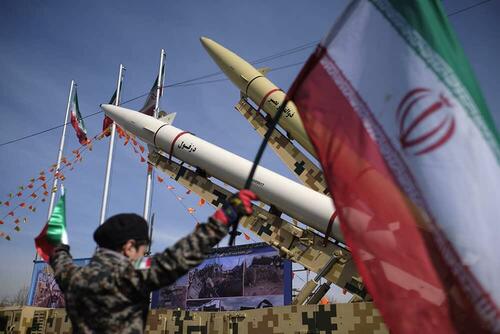
Is de-escalation between Iran and the US on the horizon? This week's reported prisoner swap deal suggests so, but analysts still by and large say this is not a "deal" which somehow will lead to a quick restoration of JCPOA nuclear agreement talks.
But the The Wall Street Journal is citing government sources who believe "Iran has significantly slowed the pace at which it is accumulating near weapons-grade enriched uranium and has diluted some of its stockpile," according to a Friday report. "The more slowly Tehran accumulates highly enriched uranium, the less potential fissile material it has for nuclear weapons," the report underscores.

Just on Thursday the United States and Iran revealed they've reached a rare prisoner swap agreement, which is to soon lead to the freeing of five Iranian-American dual citizens, and in exchange Tehran has been guaranteed access to an estimated $6 billion in its own blocked oil revenue. The US is also expected to release an unspecified number of jailed Iranians.
The Americans have yet to be released, but are said to have been moved from Iran's notorious Evin Prison, and placed into house arrest as a first step.
The WSJ situates this first leg of the prisoner swap deal as intending to lead to future nuclear talks:
If the U.S. detainees are set free, Iran will gain access to billions of dollars of oil revenues trapped in South Korea under U.S. sanctions.
U.S. and European officials have told Iran that if there is de-escalation of tensions over the summer, they would be open to broader talks later this year, including on Iran’s nuclear program.
The unnamed officials describe a slowed process toward near-weapons-grade enrichment:
According to the people, Iran has diluted a small amount of 60% enriched uranium in recent weeks and slowed the rate at which it is accumulating new material. Iran’s stockpile has grown since the 114 kilograms of highly enriched uranium Iran was recorded having in May, but it could easily dilute more of the 60% it has produced to get back to that level. It isn’t yet clear if Tehran plans to do that.
Iran was adding just short of 9 kilograms of 60% to its stockpile on average between February and May.
But with the White House's Ukraine policy coming under growing public criticism, and increasingly skeptical GOP leadership in the House, President Biden needs a foreign policy "win" going into 2024.
So far the swap deal appears as follows... the US unfreezes $6 billion in Iranian oil assets, Americans can come home, and Biden can claim to have overseen reduced uranium enrichment by Tehran on the campaign trail.
By making Iran’s ability to buy food and medicine part of a hostage deal, they’re admitting that sanctions don’t really have a “humanitarian exemption.”
— Matthew Petti (@matthewpetti.bsky.social) (@matthew_petti) August 11, 2023
Saying that “money is fungible” is the beginning of a justification. https://t.co/8whGdCCmm6
But it remains that persistent bellicose rhetoric traded between the Iranians and Israelis is likely only to incentivize the Islamic Republic to keep its 'nuclear program option' on the table.
Is de-escalation between Iran and the US on the horizon? This week’s reported prisoner swap deal suggests so, but analysts still by and large say this is not a “deal” which somehow will lead to a quick restoration of JCPOA nuclear agreement talks.
But the The Wall Street Journal is citing government sources who believe “Iran has significantly slowed the pace at which it is accumulating near weapons-grade enriched uranium and has diluted some of its stockpile,” according to a Friday report. “The more slowly Tehran accumulates highly enriched uranium, the less potential fissile material it has for nuclear weapons,” the report underscores.

Just on Thursday the United States and Iran revealed they’ve reached a rare prisoner swap agreement, which is to soon lead to the freeing of five Iranian-American dual citizens, and in exchange Tehran has been guaranteed access to an estimated $6 billion in its own blocked oil revenue. The US is also expected to release an unspecified number of jailed Iranians.
The Americans have yet to be released, but are said to have been moved from Iran’s notorious Evin Prison, and placed into house arrest as a first step.
The WSJ situates this first leg of the prisoner swap deal as intending to lead to future nuclear talks:
If the U.S. detainees are set free, Iran will gain access to billions of dollars of oil revenues trapped in South Korea under U.S. sanctions.
U.S. and European officials have told Iran that if there is de-escalation of tensions over the summer, they would be open to broader talks later this year, including on Iran’s nuclear program.
The unnamed officials describe a slowed process toward near-weapons-grade enrichment:
According to the people, Iran has diluted a small amount of 60% enriched uranium in recent weeks and slowed the rate at which it is accumulating new material. Iran’s stockpile has grown since the 114 kilograms of highly enriched uranium Iran was recorded having in May, but it could easily dilute more of the 60% it has produced to get back to that level. It isn’t yet clear if Tehran plans to do that.
Iran was adding just short of 9 kilograms of 60% to its stockpile on average between February and May.
But with the White House’s Ukraine policy coming under growing public criticism, and increasingly skeptical GOP leadership in the House, President Biden needs a foreign policy “win” going into 2024.
So far the swap deal appears as follows… the US unfreezes $6 billion in Iranian oil assets, Americans can come home, and Biden can claim to have overseen reduced uranium enrichment by Tehran on the campaign trail.
By making Iran’s ability to buy food and medicine part of a hostage deal, they’re admitting that sanctions don’t really have a “humanitarian exemption.”
Saying that “money is fungible” is the beginning of a justification. https://t.co/8whGdCCmm6
— Matthew Petti (@matthewpetti.bsky.social) (@matthew_petti) August 11, 2023
But it remains that persistent bellicose rhetoric traded between the Iranians and Israelis is likely only to incentivize the Islamic Republic to keep its ‘nuclear program option’ on the table.
Loading…




